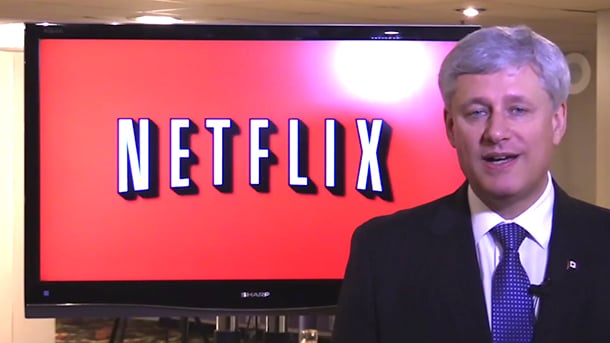This week my regular technology law column focused on the long election campaign and the prospect that digital issues might get some time in the spotlight. The column pointed to three broad themes -- what comes after Bill C-51, the Trans Pacific Partnership, and a digital strategy 3.0. As part of the digital strategy discussion, I stated that questions abound, including "are new regulations over services such as Netflix on the horizon?"
Prime Minister Stephen Harper addressed that question yesterday with a video and tweet in which he pledged that the Conservatives will never tax digital streaming services like Netflix and YouTube. Harper added that the Liberals and NDP have left the door open to a Netflix tax, but that he is 100 per cent opposed, "always has been, always will be."
Both opposition parties quickly responded with the NDP saying they have not proposed a Netflix tax and the Liberals saying they have never supported a Netflix tax and do not support a Netflix tax.
So is this much ado about nothing?
Not exactly. First, there are groups and provincial governments that support a Netflix tax or mandated contribution to fund the creation of Canadian content. These include the Ontario and Quebec governments along with many creator groups. Earlier this year, I obtained documents under the Ontario Freedom of Information and Protection of Privacy Act that showed the Ontario government spent months working toward a recommendation to expand the regulation of new media, including Canadian content requirements and increased regulation of foreign online video providers.
Second, while the Liberals and NDP have not proposed a Netflix tax, they have called for requirements that online video providers disclose revenues, Canadian content availability, and subscriber numbers to Canadian regulators. This is a very soft form of regulation that Netflix and Google have rejected as beyond the power of the Broadcasting Act. Providing information to allow for more informed regulatory analysis does not seem particularly unreasonable, but the companies unsurprisingly fear that that analysis could ultimately lead to calls for more regulation or payments.
Third, the real Netflix tax is the prospect of a levying sales taxes on digital products such as music downloads or online video services. It was the Conservatives that raised this possibility in the 2014 budget, launching a consultation on the issue that garnered supportive comments from companies such as Rogers, which noted that Canadian-based online video services such as Shomi operate at a disadvantage since they collect GST/HST, but Netflix does not. With many countries moving toward some form of digital taxation (as I noted in a January 2015 column on the issue, the real challenge lies in the cost of implementation), it seems inevitable that Canada will do the same in order to level the playing field and recoup a growing source of revenue. The Conservatives would presumably seek to differentiate between a generally applicable sales tax and a tax or fee targeting online streaming services, though many may feel it is a distinction without a difference.
Six weightier questions for candidates
Given the context, I think discussion of a Netflix tax (whether the debate is about supporting Canadian content or taxation of digital services) is fair game. However, my concern is that it distracts from far more important digital policies. As I noted on Tuesday, questions include:
1. What do the parties plan to do after Bill C-51?
2. Where do they stand on specific provisions in the TPP?
3. Are there more changes coming to the wireless sector to increase competition and lower consumer costs?
4. Will the parties support programs that ensure both universal access and address affordability concerns that have left millions of Canadians on the digital sidelines?
5. Do the parties have any policies planned to support Canadian content or to address the future of the CBC?
6. Are reforms to the copyright notice-and-notice system that has resulted in Canadians facing thousands of demands for settlements forthcoming?
No shortage of questions that are not easily answered in a tweet. ![]()
















Tyee Commenting Guidelines
Comments that violate guidelines risk being deleted, and violations may result in a temporary or permanent user ban. Maintain the spirit of good conversation to stay in the discussion.
*Please note The Tyee is not a forum for spreading misinformation about COVID-19, denying its existence or minimizing its risk to public health.
Do:
Do not: